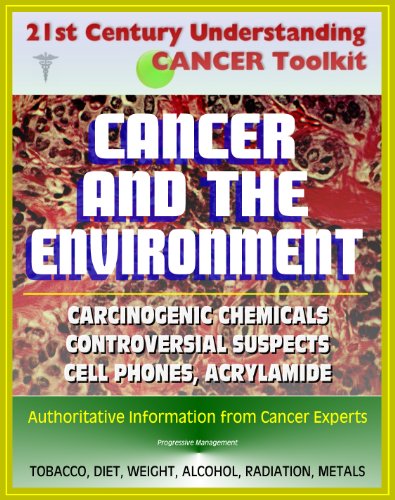21st Century Understanding Cancer Toolkit: Cancer and the Environment - Carcinogenic Chemicals, Other Causes, Controversial Suspects (Cell Phones, Meat Chemicals, Acrylamide, Artificial Sweeteners)
CHEAP,Discount,Buy,Sale,Bestsellers,Good,For,REVIEW, 21st Century Understanding Cancer Toolkit: Cancer and the Environment - Carcinogenic Chemicals, Other Causes, Controversial Suspects (Cell Phones, Meat Chemicals, Acrylamide, Artificial Sweeteners),Wholesale,Promotions,Shopping,Shipping,21st Century Understanding Cancer Toolkit: Cancer and the Environment - Carcinogenic Chemicals, Other Causes, Controversial Suspects (Cell Phones, Meat Chemicals, Acrylamide, Artificial Sweeteners),BestSelling,Off,Savings,Gifts,Cool,Hot,Top,Sellers,Overview,Specifications,Feature,on sale,21st Century Understanding Cancer Toolkit: Cancer and the Environment - Carcinogenic Chemicals, Other Causes, Controversial Suspects (Cell Phones, Meat Chemicals, Acrylamide, Artificial Sweeteners) 21st Century Understanding Cancer Toolkit: Cancer and the Environment - Carcinogenic Chemicals, Other Causes, Controversial Suspects (Cell Phones, Meat Chemicals, Acrylamide, Artificial Sweeteners)

21st Century Understanding Cancer Toolkit: Cancer and the Environment - Carcinogenic Chemicals, Other Causes, Controversial Suspects (Cell Phones, Meat Chemicals, Acrylamide, Artificial Sweeteners) Overview
This e-book presents a thorough review of the subject of cancer and the environment, with authoritative information from the nation's cancer experts. Some of the questions answered include: What causes cancer? * The nature of cancer * What substances in the environment are known to cause or are likely to cause cancer in humans? Where are they found? * Tobacco * Diet/Weight/Physical Inactivity * Alcoholic drinks * Ultraviolet radiation * Viruses and bacteria * Ionizing radiation * Pesticides * Medical drugs * Solvents * Fibers, fine particles, and dust * Dioxins * Polycyclic aromatic hydrocarbons (PAHs) * Metals * Diesel exhaust particles * Toxins from fungi * Vinyl chloride * Benzidine * What are some ways to reduce the risk of developing cancer or detect cancer at an early stage? * How do scientists identify cancer-causing substances? * How do scientists decide which substances to test in animals, human laboratory cells, or human population studies? * What factors do scientists consider in determining the risk associated with different cancer-causing substances? * How do public health officials set acceptable exposure levels for environmental chemicals? * How have cancer trends changed over the past few years? Conveniently organized contents include: Acrylamide in Food and Cancer Risk; Benzene Causes Lowered Blood Cell Counts in Workers Exposed at Low Levels; Aspartame and Cancer; Agricultural Health Study; Cell Phones and Cancer Risk; Antiperspirants/Deodorants and Breast Cancer: Questions and Answers; Cancer Clusters; Radon and Cancer: Questions and Answers; Magnetic Field Exposure and Cancer: Questions and Answers; Chemicals in Meat Cooked at High Temperatures and Cancer Risk; Asbestos Exposure and Cancer Risk; Artificial Sweeteners and Cancer; Hair Dyes and Cancer Risk; Fluoridated Water: Questions and Answers; Oral Contraceptives and Cancer Risk: Questions and Answers; Formaldehyde and Cancer Risk; Supplement - General Cancer Information And Resources. An extensive supplement provides background data on cancer; information on how to find resources in your own community; questions and answers about cancer; cancer information sources; and facing forward - life after cancer treatment. * This is a privately authored news service and educational publication of Progressive Management. For over a quarter of a century, our news, educational, technical, scientific, and medical publications have made unique and valuable references accessible to all people. Our e-books put knowledge at your fingertips, and an expert in your pocket!
21st Century Understanding Cancer Toolkit: Cancer and the Environment - Carcinogenic Chemicals, Other Causes, Controversial Suspects (Cell Phones, Meat Chemicals, Acrylamide, Artificial Sweeteners) Specifications
This e-book presents a thorough review of the subject of cancer and the environment, with authoritative information from the nation's cancer experts. Some of the questions answered include: What causes cancer? * The nature of cancer * What substances in the environment are known to cause or are likely to cause cancer in humans? Where are they found? * Tobacco * Diet/Weight/Physical Inactivity * Alcoholic drinks * Ultraviolet radiation * Viruses and bacteria * Ionizing radiation * Pesticides * Medical drugs * Solvents * Fibers, fine particles, and dust * Dioxins * Polycyclic aromatic hydrocarbons (PAHs) * Metals * Diesel exhaust particles * Toxins from fungi * Vinyl chloride * Benzidine * What are some ways to reduce the risk of developing cancer or detect cancer at an early stage? * How do scientists identify cancer-causing substances? * How do scientists decide which substances to test in animals, human laboratory cells, or human population studies? * What factors do scientists consider in determining the risk associated with different cancer-causing substances? * How do public health officials set acceptable exposure levels for environmental chemicals? * How have cancer trends changed over the past few years? Conveniently organized contents include: Acrylamide in Food and Cancer Risk; Benzene Causes Lowered Blood Cell Counts in Workers Exposed at Low Levels; Aspartame and Cancer; Agricultural Health Study; Cell Phones and Cancer Risk; Antiperspirants/Deodorants and Breast Cancer: Questions and Answers; Cancer Clusters; Radon and Cancer: Questions and Answers; Magnetic Field Exposure and Cancer: Questions and Answers; Chemicals in Meat Cooked at High Temperatures and Cancer Risk; Asbestos Exposure and Cancer Risk; Artificial Sweeteners and Cancer; Hair Dyes and Cancer Risk; Fluoridated Water: Questions and Answers; Oral Contraceptives and Cancer Risk: Questions and Answers; Formaldehyde and Cancer Risk; Supplement - General Cancer Information And Resources. An extensive supplement provides background data on cancer; information on how to find resources in your own community; questions and answers about cancer; cancer information sources; and facing forward - life after cancer treatment. * This is a privately authored news service and educational publication of Progressive Management. For over a quarter of a century, our news, educational, technical, scientific, and medical publications have made unique and valuable references accessible to all people. Our e-books put knowledge at your fingertips, and an expert in your pocket!

